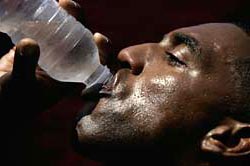Water Requirements
 |
How much should I drink?
The average human intake level is about three quarts (96 ounces) including food and water. About half of your water intake can be satisfied by food, if that is, the food has high water contents, such as, fruits, vegetables, legumes, and grains. Other foods such as meats do not contribute to water intake nearly as much. One rule of thumb put forth by many nutritional researchers is to drink approximately ½ your body weight in ounces daily. For example, a 150 lb person would drink about seventy-five ounces per day. This would be adjusted up or down slightly depending on the factors mentioned previously, climate, activity level, dietary habits, etc.
When should I drink water?
Drinking one or two glasses upon waking is a good practice. Water should also be taken in between meals, not closer than forty-five minutes after or thirty minutes before a meal. If water is taken too close to a meal it will dilute digestive juices, weakening the digestive process. Water and other beverages should be avoided or limited to very small amounts at mealtime. Additional water or hydration beverages should be taken before during and after physical activity.